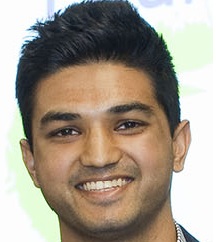
Watch Dr Kartik Iyer accept his research grant and hear a bit about the project.
PROJECT SUMMARY:
Childhood concussion is on the rise. Over 1 in 10 children who present to an emergency care setting with a mild traumatic brain injury (mTBI) will develop persistent concussion symptoms 4 weeks after their injury. The impact of this injury is concerning as it occurs in a critical brain development window. It can lead to significant problems in cognitive, emotional, and social functions that may become chronic.
Currently, treating for persistent concussion symptoms in children is problematic. Clinical management of the condition is approached case-by-case, with heterogeneous results. An emerging therapy to manage symptoms of concussion is non-invasive brain stimulation (NiBS). The targeted use of NiBS is thought to promote the functional reorganisation of local and diffuse patterns of communications between brain regions (i.e. stimulation promotes better whole-brain connectivity). Such brain stimulation methods have gained an established role for the treatment of adult conditions such as major depression and stroke. As such, NiBS presents a safe and non-invasive therapy to potentially alleviate symptoms of concussion in children.
A major impediment for the use of NiBS in paediatric populations is the knowledge gap in the understanding of the effects NiBS on the brain of children recovering from concussion. Cutting-edge techniques that allow an in-vivo measure of whole-brain connectivity are best placed to determine how NiBS contributes to the restore of brain functions in children with mTBI.
Our trial will monitor brain activity (EEG, functional MRI) in 50 children with persistent concussion symptoms whilst receiving NiBS therapy. Using brain activity recordings, we will examine the change in whole-brain brain connectivity to examine how NiBS promotes better clinical outcomes for children with persistent concussion symptoms. This new knowledge will significantly advance our understanding of a child’s brain following a concussion and how they may benefit from a targeted intervention such as NiBS therapy.
Published article: Iyer – Concussion et al 2019 Annals of Clinical and Translational Neurology 2019



 The Brain Foundation is the largest, independent funder of brain and spinal injury research in Australia. We believe research is the pathway to recovery.
The Brain Foundation is the largest, independent funder of brain and spinal injury research in Australia. We believe research is the pathway to recovery.